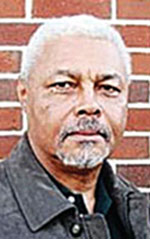Decision-Making in Times of Uncertainty
Speaking Out
BY CHARLES RAY
These are the times that try men’s souls. The summer soldier and the sunshine patriot will, in this crisis, shrink from the service of their country. But he that stands by it now, deserves the love and thanks of man and woman.
—Thomas Paine, The Crisis, Dec. 23, 1776
Though written 240 years ago, Thomas Paine’s words of resolve to American patriots attempting to throw off the yoke of English colonialism apply equally in our current uncertain times. With the State Department budget under threat, and the continued independence of the U.S. Agency for International Development under a cloud, those who are engaged in diplomacy and development have to be wondering what the future holds for their profession.
More importantly, in my opinion, they must be approaching their dayto- day jobs with a sense of trepidation; wondering how even the most routine action or decision will be interpreted by those who seem to view the profession with disdain, if not outright hostility, and who hold the fate of those professionals in their hands.
In the face of this, I’m moved to consider an issue that has so far not been a topic of public discussion: How are diplomatic professionals to conduct themselves as we inch slowly forward?
There is, of course, always the option of resignation. David Rank, chargé d’affaires at our embassy in Beijing, resigned in response to the president’s decision to withdraw the United States from the Paris Climate Agreement, stating that “as a parent, a patriot and a Christian” he could not in good conscience deliver a demarche to the Chinese government announcing our withdrawal from the agreement.
The problem with this approach—and I am not criticizing Mr. Rank for his action—is that it’s a road down which, once you travel, there is no turning back. You are no longer in a position to affect the actions and decisions of the organization from which you’re resigning. If the action you’re protesting so violates your personal moral code, it is, perhaps, the only choice; but most professional diplomats rarely come up against that line in the sand.
Grappling with Ethical Dilemmas
What, then, to do when the actions of a boss, the organization or even the head of state, impinge on personal ethical and moral beliefs?
I often wrestled with this issue during my time in active service, and since retiring in 2012, I have devoted many hours to researching it. Not often as stark as the Rank incident, these situations are ethical dilemmas. I first encountered that term when I was providing pre-deployment training to army units about to be stationed overseas in situations where they would have to coordinate with civilian agencies and American diplomatic establishments.
Included in the soldiers’ field exercise was a scenario called “the ethical dilemma,” in which they were presented with a situation that was not combat-related and asked to assess it and decide on the appropriate response. Such ethical decision-making is also a key component in the training of young Marine lieutenants.
While ethics is a part of our training at the Foreign Service Institute, my survey of the courses being offered indicates that FSI emphasizes compliance-based ethics. Such courses do not address the issue of “value conflict”—those situations when it’s not a matter of legal versus illegal, or even right versus wrong, but when two or more courses of action are legal, but contain value conflicts.
For example, what does an FSO decide when asked to do something that is legal, and in a certain context, right, but would forestall another action that is also legal and right? An example from my own experience illustrates the point.
When I served as ambassador to Zimbabwe, an American citizen was arrested in one of the provinces on trumped-up charges by an over-zealous provincial police chief. While the embassy, myself included, worked quietly behind the scenes with senior government officials, the governor of the same province made an inflammatory public statement about the operation of nongovernmental organizations (NGOs) in his province; his announcement was out of line with Zimbabwe’s national policy and exacerbated a situation that NGOs were facing in other countries.
I’d like to be able to say that my FSI training or my time in uniform prepared me to assess such situations, but sadly, that’s not the case.
At the time, our policy was to take a firm line on such actions, which would, ordinarily, have called for a strong public statement at the least. But I faced a dilemma: If I made a public statement against the governor, it would probably have torpedoed our efforts to secure the American’s release from prison.
On the other hand, failing to respond could lead to problems with NGO operations countrywide; and, at the time, the majority of our programs were run through NGOs. I had two “right” courses of action. What was I to do?
I decided that the most immediate and identifiable harm would be caused if we did anything to jeopardize the American citizen’s situation. Because the other nine provincial governors had publicly expressed disagreement with their colleague’s position, and I had received assurances from senior national officials that the national policy would continue to be applied, I decided that any immediate harm to NGOs would be minimal, and we would have time to work it out after the American had crossed Zimbabwe’s border as a free man.
Events vindicated my decision. The American was freed with an apology from the police, and the NGO announcement turned out to be all smoke and no fire. The governor had been trying to burnish his credentials as a hard-liner, and had overreached. His announcement was quietly ignored and the NGOs continued to operate under the existing rules. Later, the NGOs thanked me for not muddying the waters of their closeddoor negotiations with the governor with a provocative public statement.
I’d like to be able to say that my FSI training or my time in uniform prepared me to assess such situations, but sadly, that’s not the case. I had to rely on my own instincts and experience, trusting that they were right.
Transforming Training
If we are to prepare Foreign Service personnel of all ranks to operate effectively in these troubled times, this has to change. While compliance ethics must remain a part of our training, it is not sufficient. We need to prepare our people to operate effectively in the gray areas—the situations when the line between right and wrong is blurred. They have to be able to assess situations when they face a clash of values and have the tools to make informed decisions.
The place to start this transformation is in our training. A method currently being used in some Marine Corps classes offers one possibility. Known as decision-forcing cases (DFC), this type of training puts the student in a situation, real or hypothetical, and then requires him or her to go through the decisionmaking process and come to a conclusion.
In the real cases, students have actual events against which to judge their decisions. Even in hypothetical cases, they tend to retain the lessons learned longer than they would from lectures alone. The Foreign Service Institute uses a similar method in its consular training.
The Basic Consular Course, known as Congen Rosslyn, puts FSOs about to go out on consular tours in hypothetical consular situations, in the hypothetical Republic of Z. In simulation exercises, they face challenges such as problematic visa interviews, which require them to apply the regulations and their own knowledge to come up with solutions. I retained more from the consular training course than almost any of the other courses I took at FSI during my career, with the exception of media training, which also put students in real-life situations.
Introducing the case method, or a version of DFC, to all FSI training (with the possible exception of language and area studies) would ensure retention of the information, and make it easier for an FSO facing a situation in the field to find a resolution.
This won’t be easy to implement. Change is unsettling, and this would require significant changes to the way courses are taught at FSI. It would also require more buy-in from bureaus, offices and posts, requiring them to release people for training even if it means suffering gaps in staffing for short periods of time.
I’m convinced, though, that the pay-off would be worth it. Having a well-qualified individual arrive late for a position is more beneficial to the organization in the long run than having a position filled by someone who is ill-equipped to handle the demands that will inevitably arise.
I would also recommend that FSI consider introducing a course on ethical decision-making, focusing on assessing the ethics of the decisions we make across the board. As a start, such a course could be online, and it could be made a requirement for promotion to FS-1, or even lower. Eventually, though, a resident course should also be established, because more benefit is gained when face-to-face interaction is enabled.
We live in interesting, and uncertain, times. Effective diplomacy is needed now as much as, if not more, than ever before. We might not be able to forestall significant reductions in our capability in terms of numbers of people or programs, but we can ensure that those we do retain operate at optimum capacity. The ability to make good decisions in an environment of uncertainty should not be overlooked as an essential skill for every member of the U.S. Foreign Service.




